Rod Miller's Blog, page 30
May 5, 2016
Tracking Lovers, Wives & Mothers.
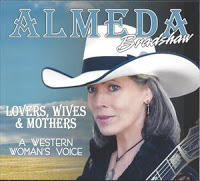
Western Writers of America named “Parker Eyes of Blue” by Almeda Bradshaw a Spur Award Finalist for Best Western Song. It’s no wonder. The song recounts the kidnapping of ten-year-old Cynthia Ann Parker by Comanche warriors during an 1836 raid in Texas. The words of the song range from lyrically beautiful:
Her eyes were the skies of the Llano EstacadoWide and deep and blue
to hauntingly graphic:
Face down hands and feet were boundEscaping not the brutal soundOf women raped upon the ground
Indian vocals open and close the song, with Almeda singing the story in between. WWA isn’t the only organization to honor the remarkable song; it’s also recognized by the Western Music Association.“Parker Eyes of Blue” may be my favorite, but it’s only one of eleven excellent tracks on her Lovers, Wives & Mothersalbum—which, you might surmise, gives us a look at the West from a female perspective. Musical styles vary from folksy traditional to hints of Western Swing and bluegrass. Most tracks are Almeda originals, including music she composed to turn poems by master poets Colen Sweeten and Bette Wolf Duncan into songs. Another composition is Almeda’s answer to “Sharon Little Hawk,” a song by Dave Stamey, one of the all-time best Western songwriters. Two of Stamey’s songs, along with tunes by other songwriting legends Tom Russell and Ian Tyson, round out the album. If you’re a fan of Western music, you’ll like Lovers, Wives & Mothers . If you’re not, this album could change your mind.
Published on May 05, 2016 09:48
April 28, 2016
Lies They Tell Writers, Part 27: Editors are Idiots

We’ve all heard horror stories about editors. Complaints range from “She just doesn’t get it” to “He totally ruined the book” to anything and everything in between. Some of those tales might be true. It’s unlikely that editors, on average, are more capable at their chosen craft than other folks are at theirs—so, odds are there are some idiot editors out there. On the other hand, it’s equally unlikely that the ratio of dumb editors exceeds the human average, either. Most editors, in my experience, are smart folks. Perhaps I’ve been lucky. But none of the editors I’ve worked with has ever done anything other than help make a book (or article or story) better. And their “touch” has tended to be light, and deft. The same holds true with copy editors. Their assistance has been valuable and, on occasion, they’ve kept me from making a fool of myself. On the other hand, I have heard a few editors at writers’ conferences say that once they’ve accepted your book it’s no longer “your” book, but “our” book, and you can expect wholesale changes to suit their fancy. As a writer, I’m afraid I would have to edit that attitude. Because, despite the important contributions editors can make, it’s still mybook, not theirs. And any editor who doesn’t recognize that basic fact is, at best, a frustrated writer. And, quite possibly, an idiot.
Published on April 28, 2016 09:24
April 17, 2016
Antisocial media and me.
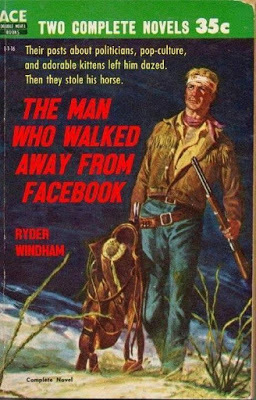
The make-believe book cover above came my way from another writer. I laughed when I saw it. But I cannot appreciate it fully as I haven’t had to walk away from Facebook. That’s because I’ve yet to walk in those social media boots. Seldom does a week pass without a notice or three arriving in my e-mail inbox that says so-and-so would like to add me to this or that network or list or circle or ring or book or something. I never respond.Not that I don’t know, and even like, some of the people behind these requests (although a good many of them come from complete strangers). The thing is, I don’t get it. I have no idea what I would be signing up for and what would result. I have yet to find sufficient motivation to allay that ignorance. And I have yet to think it worth whatever time or attention, if any, might be required of me if I did get added or listed or circled or ringed or booked. Between researching and writing books and magazine articles and sending out these little screeds, I already spend enough time staring at computer screens to blind myself.So, if you invite me to join some online something and I don’t, don’t be offended. It’s nothing personal. I just want to avoid getting overpowered by pixels and gobbled up by bytes. It’s probably a losing battle. But so far, my metaphorical horse hasn’t been stolen by social media.

Time is short to enroll for the Write Here in Ephraim Writer's Conference. See you there.
Published on April 17, 2016 06:39
April 9, 2016
Lies They Tell Writers, Part 26: Strive for Clarity and Closure

I was once taken to task by a reader when a short story I wrote wasn’t all wrapped up at the end and neatly tied up with a bow. He found it unsatisfactory that a story should end without answering all the questions, solving all the problems, and, if not with a happy ending, at least one with good triumphing over evil.While “happy” or clearly resolved endings are the norm in literature, they are far from normal in real life. The world we live in is messy. Sometimes the bad guys win. Sometimes nobody wins. Things seldom turn out the way we want them to.To my way of thinking, there’s a lot more ambiguity in life than clarity or closure. And that ought to be reflected in literature.One of my favorite movies is The Mission. It’s set in a remote South American mission during the Spanish conquest. When it’s over, you’re left to wonder which of the two padres—who share the same fate but come to it from opposite directions—is the hero and which is the goat. Ambiguity at its best.I think it is good to allow—even force—readers to participate in a story, and ambiguity can do that. And, if a writer leaves readers with questions rather than answers, a story can last long after the book is closed. Let’s close this book with a bit of wisdom from Stanley Kubrick: “Ambiguity is the end product of avoiding superficial, pat truths.”
 If you are or aspire to be a writer, you can learn more lies—and truths—about writing at the Write Here in EphraimWriters Conference, April 22-23.
If you are or aspire to be a writer, you can learn more lies—and truths—about writing at the Write Here in EphraimWriters Conference, April 22-23.
Published on April 09, 2016 06:42
April 2, 2016
A full Saddlebag.
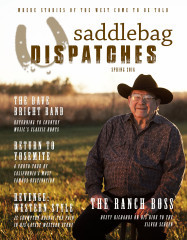
A new issue of Saddlebag Dispatches is now available and you can access it online. Included is the conclusion, Part 3, of my long short story, “The Passing of Number 16.” It’s a modern-day rodeo mystery about the death of a prime bucking horse. Parts 1 and 2 are available in the magazine’s back issues if you need to catch up. Or, you can read the story in its entirety in my new collection of short fiction, The Death of Delgado and Other Stories, from Pen-L Publishing.
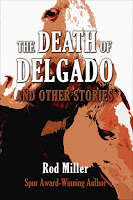
But, back to Saddlebag Dispatches. The magazine is an ambitious venture ramrodded by my friend, legendary writer Dusty Richards. The publication is all about the American West and includes short fiction, nonfiction, historical articles, photo essays, and more. There’s even a column they asked me to write. I call it “Best of the West” and it features what I think is some of the best in Western literature, art, and anything else Western. The first column featured the classic poet Charles Badger Clark. “Best of the West” in the new issue is all about sculptor Jeff Wolf, whose creations capture the heart and soul and spirit of the West in remarkable works of art. Featured in the magazine are photos of several of Jeff’s sculptures. Don’t miss this chance to see the West through an extraordinary artist’s eyes and hands.
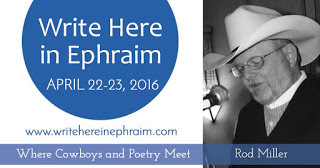
Finally, a plug about the Write Here in Ephraim Writer’s Conference. If you have ambitions to be a writer or improve your writing, it’s the place to be April 22-23. I’ll be doing sessions on writing about the West and cowboys and poetry. See you there.
Published on April 02, 2016 07:44
March 25, 2016
Brenn Hill rides the high line.
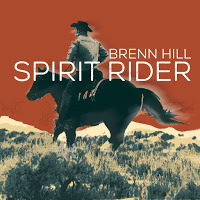
Brenn Hill is one of my favorite songwriters. And singers. He has written a stack of albums filled with songs that capture the soul and spirit and stink and sweat of the American West. To my way of thinking, several of his songs are destined to become classics, played and sung and remembered for decades to come. His latest album, Spirit Rider, is a bit of a departure from what Brenn usually offers. When I say he rides the “high line” with this album, I mean to say he gives us a glimpse of horseback heaven, which is as high a line as there is. The songs on Spirit Rider—some written by Brenn, some traditional hymns—remind us of the importance of faith, hope, and charity in our world and our lives. All done The Cowboy Way. Spirit Rider (read more about it here: www.BrennHill.com) was a long time coming. Years in the making, as they say. And there’s a very good, very real reason Brenn set out on this particular ride up this particular trail. You can read about it in a story I wrote for the latest issue of Ranch & Reata magazine, which is filled with a lot of other interesting and informative and entertaining articles about life in the West.
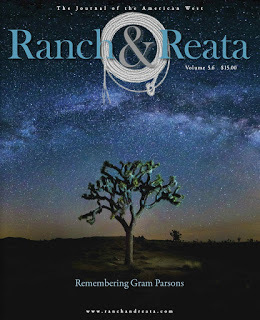
Published on March 25, 2016 06:59
March 19, 2016
Rawhide Robinson feels the prod of a Spur rowel.
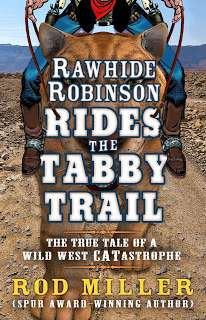
My latest novel, Rawhide Robinson Rides the Tabby Trail: The True Tale of a Wild West CATastrophe , is a rollicking story of an ordinary cowboy who finds himself in extraordinary situations. This time, he sets out to relieve a rat infestation in the mining boomtown of Tombstone by driving a herd of cats there. On top of the adventures the drovers meet along the way, Rawhide Robinson regales the cowboy crew around the campfire with more of his over-the-top tall-tale escapades. Young adults and adults who have never quite grown up all the way will enjoy the humor and excitement in the stories.
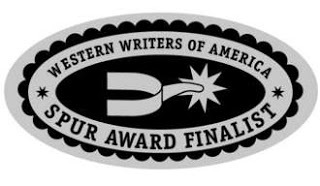
It seems the judges in the Western Writers of America Spur Awards enjoyed the book, as they selected it as a Finalist for Best Western Juvenile Novel. I’m looking forward to the award ceremony at the WWA convention in June in Cheyenne, Wyoming.My earlier Rawhide Robinson novel, Rawhide Robinson Rides the Range: True Adventures of Bravery and Daring in the Wild West , won the 2015 Spur Award. Not a bad showing for an ordinary cowboy.
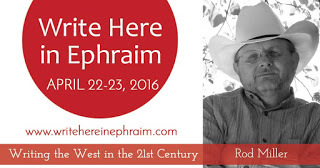
Reminder: I will be talking about Western writing at the Write Here in Ephraim writers conference. C’mon down and join the fun.
Published on March 19, 2016 22:12
March 13, 2016
Lies They Tell Writers, Part 25: Chronological is Logical

In Alice’s Adventures in Wonderland by Lewis Carroll, the King tells the White Rabbit, “Begin at the beginning and go on till you come to the end: then stop.”The vast majority of writers and storytellers before and since have followed that advice. Sometimes—maybe most of the time—it makes sense to follow a strict linear progression and tell a story chronologically.But not always.Sometimes, it’s more fun for a writer—and more engaging for the reader—to mix things up a bit. There are lots of ways to do it. Simple things, like a prologue or epilogue. A flashback, or flash forward. An interruption by a letter or document or artifact or other insertion from another time or place. Those are fairly easy for the reader to handle, and can add interest to a written work.There are, however, more inventive ways to violate chronology.The Meadowby James Galvin is one of my all-time favorite books, and I’ve read it over and over again. The book covers a century, but its passages—like short chapters—are arranged at random, so you read about something that happened a week ago, turn the page and read something from eighty years ago, turn the page and read about something that happened twenty years ago. And so on, throughout the book. The technique, in Galvin’s skilled hands, is riveting. William Faulkner also rearranges time to great effect. On a more banal level, I once wrote a short story in which present-day events that unfold chronologically are interlaced with a story from the past that unfolds in reverse—it begins with the end and ends with the beginning. It was a Finalist for a Western Writers of America Spur Award.I’ve tried other ways of playing with time with varying degrees of success. I think such techniques, if well done, invite the reader to participate and become part of the story. What could be more fun?The point is, chronology is fine—but you don’t have to be restricted by the clock or the calendar.

Reminder: To learn more lies—and truths—about writing, come to the Write Here in Ephraim Writers Conference, April 22-23.
Published on March 13, 2016 07:17
March 5, 2016
Mary Kaye rides into the winner’s circle.
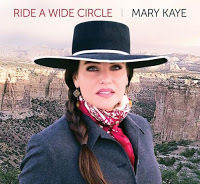
Some time ago I wrote about singer-songwriter Mary Kaye’s latest album, Ride a Wide Circle. Although I am seldom at a loss for words when my fingers touch a keyboard, it was difficult to sing the praises for that album effectively. The judges for the National Cowboy and Western Heritage Museum’s Western Heritage Awards liked it too—they named the album’s title song winner of the Wrangler Award for music for Original Western Composition. And it’s no wonder. Say these few lines from the song and you’ll hear echoes of the beauty of her language:
And he’ll ride a wide circle, checkin’ stock and makin’ plans’Cause he’s got dreams tied hard and fast, and they hold him to this land.Yes, he’ll ride a wide circle and today he’ll ride aloneIn a saddle that’s no rich man's trophy, it’s a workin’ man’s throne.
Hats off to Mary Kaye for another in a long line of awards recognizing her extraordinary abilities as a singer and, more important to my way of thinking, a songwriter. Visit her website and rope in a copy of Ride a Wide Circle.
Published on March 05, 2016 06:13
February 26, 2016
Getting to know Bob.
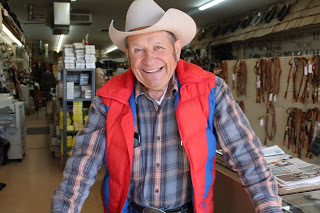
The latest issue of RANGE magazine has been out for a while, but I am still thumbing through it and enjoying the photos and stories. Of particular note (to me) is a short profile in the magazine’s “Red Meat Survivors” section I wrote about one of the best men I’ve met—Bob Schild. If you haven’t had the good fortune to meet Bob, let this profile in RANGE serve as an introduction. When I set out on a quest to become a poet, Bob’s poetry was an inspiration, partly because he wrote a lot about rodeo, which I can relate to, and partly because his poems are so well-made, with terrific turns of phrase. Some of his poems are serious and deeply emotional, and I don’t mean shallow sentiment. Some of his poems are humorous, and I mean funny stories, not cheap and easy joke poems. All his poems are authentic. I hunted Bob up one afternoon many years ago at a rodeo arena and introduced myself (a thing I seldom do, being somewhat shy). He was cordial and kind, and a friendship grew from there and continues all these years later. You can read about Bob (and many other things Western) in RANGE by subscribing here: http://www.rangemagazine.com/
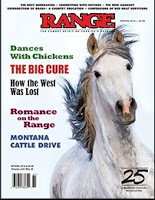
Published on February 26, 2016 15:20



